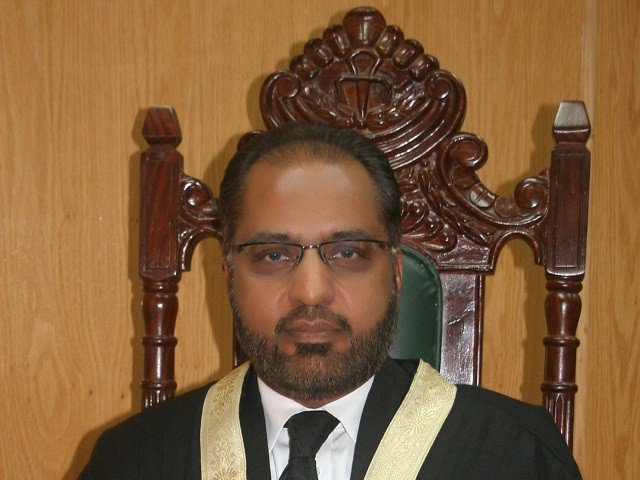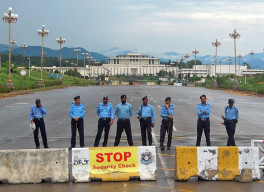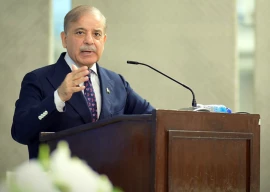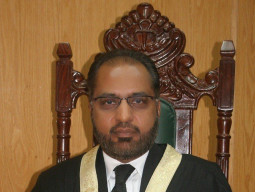
The Supreme Court, under the stewardship of Chief Justice of Pakistan (CJ) Qazi Faez Isa, has etched another chapter in the annals of legal history by overturning the Supreme Judicial Council’s (SJC) stance on the removal of a high-ranking judiciary member.
However, despite this judicial milestone, the apex court has displayed a judicious restraint by not delving into the weighty accusations put forth by former Islamabad High Court (IHC) judge, Shaukat Aziz Siddiqui, regarding the manipulation of courts in the Panama Papers case proceedings.
Notably, the larger bench in its ruling did not emphasise the investigation into the allegations made by the former IHC judge.
This restraint comes despite the recommendation from the Islamabad Bar Association, presented by Salahuddin Ahmed Advocate, urging the Supreme Court to instruct the federal government to establish an inquiry commission to investigate Siddiqui's claims.
On the other hand, Shaukat Aziz Siddiqui, in his response, argued that the SJC could investigate the allegations concerning the manipulation of judicial proceedings by agencies in the Panama Papers case.
"If it is decided that an inquiry is necessary, then it can only be conducted by the SJC and no other body or authority because the investigation into a judge's conduct can only be undertaken by the SJC and no one else," he stated.
A senior lawyer agreed that the larger bench could not address the allegations.
"At best they could have made a commission or perhaps sent it to the SJC again. But then it would have left Shaukat Aziz Siddiqui’s case hanging in balance. I guess this was the most straightforward way forward," he added.
Also read: IHC former judge regains his honour
Salahuddin Ahmed Advocate, commenting on the judgment, remarked that it is a favourable decision.
"The SJC could not have found Shaukat Aziz Siddiqui to have committed misconduct justifying removal without at least allowing him to lead evidence proving the truth of his allegations,” he opined.
Salahuddin also concurred that an investigation into those allegations should have been conducted, and if found to be true, appropriate action should have been taken against the perpetrators.
It wasn't solely about Shaukat Aziz Siddiqui; it also concerned the unlawful interference of intelligence agencies in judicial matters.
"The case's prolonged delay over five years, during which it remained on hold under successive chief justices, has rendered it largely academic, especially considering that all the main actors involved have since retired," he added.
Justice Siddiqui was not in the good books of ex-CJPs Mian Saqib Nisar and Asif Saeed Khosa. Both former chief justices were gunning for his removal even before his notorious July 2018 speech at the Rawalpindi Bar Association.
He said Siddiqui was already in hot water facing charges of misconduct. However, after his speech, the SJC decided to expedite the process for his early removal.
It is pertinent to note that at that time, the higher judiciary and powerful circles were on the same page.
The likelihood of Siddiqui receiving relief was slim during the tenures of “like-minded” chief justices such as Saqib Nisar, Asif Saeed Khosa, Gulzar Ahmed, and Umar Ata Bandial. However, it was expected that Siddiqui would find some reprieve during CJ Isa's term.
Commenting on the matter, Advocate Hafiz Ahsaan Ahmad Khokhar stated that while Article 209 of the Constitution permits the commencement of proceedings to remove a judge, Articles 209(5) and 209(6) impose obligations on the SJC to hold a proper inquiry into a judge’s alleged misconduct.
He noted that since this had not been done in the case of Siddiqui as expressly required by the Constitution, the Supreme Court correctly and legally held that the judge was not treated in accordance with the law as required by Articles 4, 10-A and clauses (5) and (6) of Article 209 of the Constitution.
He said Article 209(7) of the Constitution protects judges' tenure by stating that judges of the Supreme Court or of a high court shall not be removed from office except as provided by this Article, which includes clauses (5) and (6) of Article 209 of the Constitution that mandate the SJC to conduct an inquiry before determining whether a judge is guilty of misconduct.
“Thus as a result, the Constitution forbids the removal of a judge from office without first conducting an inquiry regarding any alleged misconduct, and this has been rightly held by SC under the constitutional jurisdiction in the present case.”
He said a judge's tenure is guaranteed by the Constitution because it ensures independence of judiciary and allows for removal of judges who engage in misconduct after giving them a fair trial.
The legal expert highlighted that in all previous cases where the removal of judges from office was the ultimate outcome of proceedings under Article 209 of the Constitution, it was achieved through proper inquiry and evidence gathering.
“However, in the current case of Justice Siddiqui, this procedure was not followed. As a result, the five-member bench of the Supreme Court concluded that a fair trial process was not afforded to Siddiqui.
According to Khokhar, the Supreme Court rightfully set aside the SJC recommendations and removal notification dated October 11, 2018, on the grounds that no court, including the SJC, can undermine the principles of due process and fair trial as outlined in Article 4 and 10-A of the Constitution.
“As a result of the current ruling, Justice Siddiqui will be deemed to have retired as a judge of the IHC and will be eligible to receive all benefits and privileges accorded to a retired judge,” he said.



1731975305-0/Untitled-design-(40)1731975305-0-165x106.webp)
1731975060-0/Untitled-design-(39)1731975060-0-165x106.webp)





1731929357-0/Express-Tribune-(6)1731929357-0-270x192.webp)









COMMENTS
Comments are moderated and generally will be posted if they are on-topic and not abusive.
For more information, please see our Comments FAQ